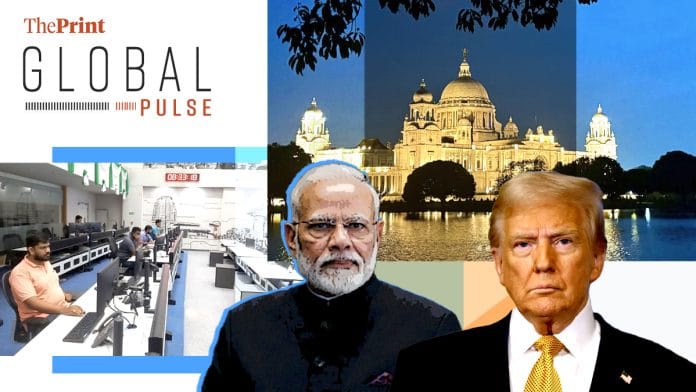New Delhi: The chill in India-US ties, triggered by Donald Trump’s higher tariffs on New Delhi, is now visible among citizens—their perception of the US has taken a 180-degree turn, reports Karishma Mehrotra in the Washington Post. “The harsh rhetoric from American officials has dovetailed with escalating hate speech online targeting Indians and Indian-Americans, according to researchers, hardening the divide,” she writes.
Milan Vaishnav, the director of the South Asia Program at the Carnegie Endowment for International Peace, tells the Post: “Even if there is a mend in ties, this betrayal of trust will be remembered for a long time.”
The article goes on to quote a number of Indians, both young and old, who appear to be suspicious of the US and its motives.
“The Americans have never and can never be trusted friends,” said Sukesh Khajuria, a 65-year-old teacher in Jammu. “They can ditch us at any time.”
The tech sector has so far been immune to American shocks. However, now, the proposed Halting International Relocation of Employment (HIRE) Act is going to impose a 25 per cent tax on American companies on “payments made to foreign workers for services that are consumed in the US,” writes Veena Venugopal in this edition of the Financial Times’ India Business Briefing.
“If passed, the bill will in effect negate most of the cost benefits that make outsourcing technology services to India a viable proposition, and will affect the prospects of both IT outsourcers such as TCS and Infosys as well as the now-booming business of global capability centres or GCCs,” says the newsletter.
Despite the fact that it is still “early days” and the bill is yet to be passed by the US Congress, it is not an “impossibility”, notes Venugopal.
“India’s tech sector should not dismiss the HIRE Act as an impossibility. The business landscape for these companies in the US is increasingly a hostile one. The wise move will be to account for it and strategise a way to negate its impact on revenues and profits. While pivoting to other geographies is a good idea for diversification, it is unlikely to bear fruit immediately,” she writes.
In the face of Trump’s diatribes and attacks, Modi’s strategy has so far been “to do nothing.” This restraint might just be paying off, write Tripti Lahiri and Robbie Gramer in the Wall Street Journal.
“An Indian official said that New Delhi has deliberately chosen to be ‘measured in our communications’ and to not squander years of work improving ties with Washington,” according to the report.
“Earlier this month, Trump said India and the U.S. have a special relationship, despite the current tensions. ‘Deeply appreciate and fully reciprocate President Trump’s sentiments and positive assessment of our ties’, Modi responded in a social-media post,” says the report.
“Then on Wednesday, Trump posted on Truth Social that trade negotiations with India were continuing and would soon reach a successful conclusion. Trump looked forward to speaking with his ‘very good friend’ Modi soon.”
The report goes on to say that the “deterioration of ties” has “stunned India.”
Courtesy the Kolkata Illumination Project, the city now “sparkles like Paris” at night, reports Sandip Roy in the BBC.
“Kolkata Illumination Project is the latest addition to the city’s many heritage tours and walks. Mr Sen, who runs a tour company, chanced upon a newspaper article about city enthusiasts lighting up some of the city’s grand but often neglected heritage buildings. He obtained a list of buildings and went to check them out,” says the report, identifying the person just as Mr Sen.
“I was stunned,” he has been quoted as saying. “I have seen Paris by night. I didn’t realise Kolkata could be like that also. I wanted other people to see it.”
The project is the brainchild of a citizens’ group called Kolkata Restorers. What they are really trying to restore are not buildings but a sense of pride in the city, Roy writes.
(Edited by Ajeet Tiwari)
Also Read: India-Pakistan ‘Basmati’ tussle and RSS’ ‘Hindu-first vision for India’ as it turns 100






